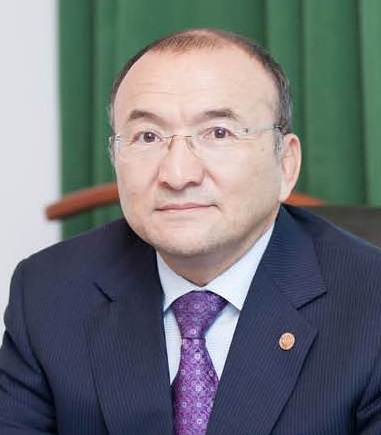NIS International Research-to-Practice Conference
Inspirational Speakers

Keynote Speakers
Assylbek Kozhakhmetov
Assylbek Kozhakhmetov is one of the founders of the first business school in Kazakhstan – Almaty School of Management, established in 1988, later transformed into International Academy of Business (IAB). In 2014 IAB was awarded University status and a new name, Almaty Management University (AlmaU).
In 2011, he received the degree of “Doctor in Business Administration” at Higher School of Management of National Research University “Higher School of Economics” (Moscow). He started his teaching career at the Department of “Mechanics of the continuous environment” at KazSU named after S. M. Kirov, then worked as a teacher at the managers school at Kazakh national organization “Union”. He attended specialized management training at training centers in Germany, France, UK, Belgium, Holland, Hungarian and Estonia. In 2013 Dr. Kozhakhmetov got a scholarship of the state program “Bolashak” and held scientific training at Business School Haas of University of California Berkeley (USA). He is speaker and moderator at national and international forums. Dr Kozhakhmetov is the author of over 60 scientific publications on management development and education. Currently he is a Board member of CEEMAN (international Association for management development in dynamic societies), member of Business Council under Almaty city government, co-chairman of KFMD (Kazakhstan Fund of management development). His awards and titles include the award of “People to People International” international organization, USA – “Torch of Birmingham” (1997), sign “Excellent specialist of education of the Republic of Kazakhstan” (1998), the Medal of Bayan “Olgiy aimak”, Mongolia (2010), jubilee medal for the 20th anniversary of Independence of the Republic of Kazakhstan (2011), order “Kurmet” (2013), order of NPP “Atameken” I and II degree “For loyalty to business” (2013-2014), award of International Association for management development in dynamic societies CEEMAN Champion Award in the category of “Institutional management” (2014), title of certified consultant for management of mass media (2015) and the title of Honorary Professor of Academy of public administration under the President of Kyrgyz Republic (2017).
IX NIS International Research-to-Practice Conference, 26-27 October 2017: Keynote Speech
Future of the school: University’s Perspective
We live in the age of new industrial revolution 4.0, “smart” economy, where total digitalization of all processes of governance and new approaches to work organization is the main driving force of industrial transformation.These transformations radically change the centuries-old landscape of secondary and higher education, and force to rethink the role of schools and universities in society, where the leading role in managing the economy will be played by smart technologies, artificial intelligence and big data. Modern pupils and students belong to generation Z (children born after 1995) are the first generation of global world, sustainable access to Network who don’t have any boundaries in thinking, capabilities and communication. Children of generation Z go to happy kindergartens, study at open innovation schools and colleges, do research and entrepreneurship at free universities. In the near 10-20 years we will see radical changes in the organization of higher education, with a focus on maximum individualization of educational trajectories and designing a future career taking into account cognitive, mental, physiological characteristics, habits and behavior of the student. Students will learn and teach others at any time and in any available place, regardless of their location on the planet, whether it is an audience of a medieval university, or an ultra-modern laboratory of virtual reality. Schools of XXI century need flexible, adaptable and cooperating teachers and managers of schools able and willing to maintain a high level of competence throughout their career and to play the role of assistants and facilitators for students. School of the future should teach “digital citizens” leadership, service to the community, fundamentals of business and proper knowledge management, obtained experience, planning tactical objectives and strategic vision of the future. Teachers and managers of schools must meet the requirements and challenges of a new era. It is necessary to teach the generation of “technology entrepreneurs” to think and work in a “smart” economy, prepare them for the process of accumulation of intellectual capital, creation of quickly developing start-ups based on innovative, high-tech and knowledge-intensive ideas.This process should be supported by a completely new ecosystem of education. The hallmarks of which are full cooperation of companies, schools and universities with the common aim of forming, educating and training leaders of a new century, who will work to create global initiatives and technological breakthroughs!
